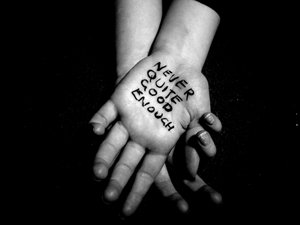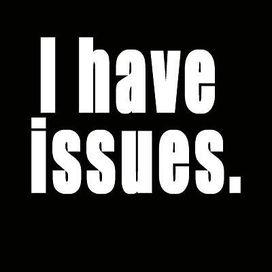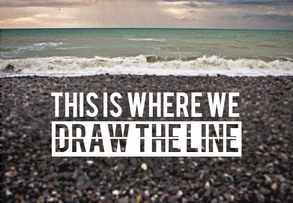 "After all I've done, and all the ways I've screwed up my life, there is no way God could love me or ever forgive me." This is something that many addicted people, hurting people, struggling and confused people will say, but it is a lie. God's not mad at you. "God's not mad at you because He knows what's wrong with you." This is one of the most striking statements made by Tracy Strawberry in her book, "Clean, Sober & Saved: The Power & Process of Change." You may feel like you'll never be quite good enough for God, but the basis of actual reality is not based on your feelings, but on the truth of Who God is, what God knows about you, and what He's already done to help you. #1: God sees it all. There is nothing hidden from God. You have no secrets from Him, so there's nothing He doesn't already know about you. This is a good thing. You don't have to fear God, nor do you have to hide from Him. Many of us hide from God for fear that He'll find out what we've done. We don't have to hide because there is nothing to hide. #2: God knows what's really going on. Whatever is your "deal" God already knows what's causing it. Whenever we struggle with issues in our life like rage, hatred, substance abuse, manipulative behavior, using people, sexual impropriety, greed and more, God doesn't just look at the surface issue, He knows the deep roots beneath the weeds on the surface. Again, even if we don't entirely understand this, the good news is that He does. #3: God knows how to fix it, and already made a way. Getting beyond our struggles is never impossible with God. He knows that the sinful nature within you (not just you, but every human being... even the ones you think have it all together) is the root beneath the surface feeding the weeds above ground. In His great love, God gave us His Son, Jesus, to take care of that on your behalf. Jesus breaks its power, cancels the death penalty, forgives the offenses, offers mercy, restores your soul, and places you on a new path to healing and freedom.
Put down the old and take up the new. Put down the drugs and take up healing. Put down the lies and take up the truth. Put away the past and begin a new future. Because God loves you and wants to heal you. AMEN. If you want to talk about your struggles with someone who can offer spiritual, Christ-centered guidance, call 716-222-0299. (Your confidential call will be returned no later than within 24 hours.)
1 Comment
 For families, spouses, and close friends of addicts the pain is just as real as the pain of the addicted one themselves. In fact, the pain and daily struggle of striving to manage the unmanageable life of an addict leaves the lives of the loved ones just as unmanageable. The emotions and struggles are overwhelming and never let up. Pain, depression, obsessive worry, anxiety, fear, hatred, anger, frustration, rage and others are the daily reality of many who live with, or are very close to, an addict. When an addict is taking the drugs, they know that it leads to harm and is really no way to live. In the same way, when the family members of addicts are desperately scrambling to manage the unmanageable life of an addict, they know deep inside that it is really no way to live. If the families and loved ones of addicts do not take care of themselves, then who will be left to help? If the minds of the loved ones are given over to insanity, then who will wisely respond to the real issues and needs? The Bible says this about an optimum way to live. Galatians 5:16 NIV So I say, live by the Spirit, and you will not gratify the desires of the sinful nature. Living by the Spirit of God leads to health and life. When we live according to the sin of others, we live a life of sin ourselves. Both persons are trapped and both need help. How then, do family members of addicts find rest for their own souls and learn to care best for their loved ones? We must follow the ways of our Lord. 1. Surrender the care of our loved one to the care of God. Family members of addicts usually believe that no one understands why they must do what they do. Not even God. This is not truth. No one will ever care for a human being or love them more than God Himself. For God so loved you, your addicted family member, and the rest of the world that He gave us Jesus. He is able to care for your loved one. He is also able to do it with more wisdom and insight than we can. In prayer, we can bravely, albeit with difficulty, go to God and surrender the daily activities of managing the lives of the addict to God. 2. Admit our own helplessness. 1 Peter 5:7 says, "Cast all your anxiety on Him, because He cares for you." Family members rarely take care of their own needs because there is no time left after managing the needs of the addict. This becomes an addiction unto itself and must be cast on the Lord. Why? Because He cares for you too. It's okay to admit our helplessness to God. In fact, if we don't, we won't leave room for Him to work. In prayer, cast your anxiety on Him and say, "I can't do this on my own any longer." 3. Trust God. When you begin to change the rules with the addict by which the game of your lives has been played, then lives will be upset. People will begin to try to force you into your old behavior. You may experience extreme guilt or worry. In those moments, we must trust God with laser focus. He is more trustworthy than anyone or anything. The bible has wisdom for these moments: Proverbs 3:5-6 NIV Trust in the LORD with all your heart and lean not on your own understanding; (6) in all your ways acknowledge him, and he will make your paths straight. 4. Don't Isolate. Get Help from an understanding community. Isolating has been the pattern for the family of the addicts all along. It's time to blow the cover off and emerge from hiding. There is help. The support you need is waiting by making one simple call to the Addiction Response Ministry phone line at 716-222-0299. Christian guidance, a compassionate voice, an understanding ear and resources for engaging in community are awaiting you. Don't travel the difficult path alone. You are loved. Your addicted loved one is loved. There is hope and healing awaiting you. Amen.  When will we all learn to erase the "us" vs. "them" from our conversations about addiction? Regularly, I hear conversations about people who are addicted and this tone creeps into the dialogue; a tone that says, "I'm glad that's not my problem." It's time to both reframe our understanding of the problem and then recast our responses to the issues. Understanding the Problem In her teaching series, "Clean Sober & Saved," Tracy Strawberry refers to passage of Scripture in Romans that points us to the root problem; a problem that exists not just in one class of people or one behavior of people, but something applicable to all of humanity. 14 So the trouble is not with the law, for it is spiritual and good. The trouble is with me, for I am all too human, a slave to sin. 15 I don’t really understand myself, for I want to do what is right, but I don’t do it. Instead, I do what I hate. 16 But if I know that what I am doing is wrong, this shows that I agree that the law is good. 17 So I am not the one doing wrong; it is sin living in me that does it. (Romans 7:14-17 NLT - emphasis added) The problem is the sin nature, and the sin nature is in all people. In one person it manifests itself in overeating. To another it becomes control and domination. To another it arises as uncontrollable anger. Others are gripped by fear. In others it shows itself to be sexually immoral. For others it manifests as greed or verbal abuse. The list goes on and on. For some, it manifests as substance abuse. The problem for all humanity is the sin nature. Sin causes pain and everyone chooses how to deal with the reality of their own pain ... some choose drugs and alcohol. The second reason why addiction is everyone's issue is understanding the social effects that snowball from it. In nearly every town in our country where substance abuse is rampant you will find tapped financial resources, overworked and discouraged law enforcement, concerned health care workers, hurting families, and so much more. However, there is hope for all of these issues; issues that we all must share and for which we must all accept ownership. Recasting our responses. "God is not mad at you." (Tracy Strawberry) Jesus comes to help, not to harm. Jesus comes to set people free, not to condemn. Isn't the problem condemning enough already? God desires your healing and is ready to make you whole in a way you never thought possible. Are you ready and willing to participate in this process? Since God is not mad at those who are affected by addiction, then why are some people so angry, and why are some who say they love God so angry? Responses of anger will never contribute to the true solution. Compassionate action is the key. Compassionate language and action will come from anyone who understands their own desperate need for God and has found hope in Him, then sees a sister or brother in need who is also loved by God, but trapped in their own troubles. Addiction causes pain, but the missing PEACE is Christ Jesus. Addiction is everyone's issue. Sin is everyone's condition. Compassionate Action is needed for all, in the name of Jesus. AMEN.  I remember the morning I woke up to discover my father had spent most of the night sleeping in his Toyota truck in the driveway. I was about 14 years old and my father's drinking problem had really begun to have a grip on his life. My mother, in her frustration as to know how to handle it, began to attend Al-Anon meetings with a neighbor. Prior to Al-Anon, Mom would just always rescue Dad and fill in the gaps for his behavior and shortcomings. Mom would make excuses for him and "help" him. Prior to Al-Anon there was yelling, objects got thrown in our home and anger escalated to seemingly dangerous levels. Frustration reigned. Knowing where to draw the line when "helping" the addicted is one of the most difficult things a loved one will ever do. However, the constant rhythm of rescuing someone from their destructive behavior simply informs them that you will always be there to "fix" and handle their issues when they overindulge. It's the meeting of two type of overindulgence... substance and saving. One gets addicted to a substance and the other to saving the addicted. Both must let go for there to be healing. It's very hard to let someone sleep in a driveway all night because they passed out in their vehicle. The loved one might lay awake all night thinking, "Am I doing the right thing?" "Perhaps I should just go out there and get them." "What if they drive off and hurt themselves or someone else?" "Will I be the one to blame if that happens?" In this case it's important to make wise choices, and resist the temptation to engage in familiar responses. In order for behavior to change, both parties have to change. Proverbs 20:1 NIV "Wine is a mocker and beer a brawler; whoever is led astray by them is not wise." The Hebrew words for "wine" and "beer" refer to intoxication. To live in a state of intoxication, albeit from drink or responding to the drinker, is not wise. Both need wisdom. Wisdom comes from God. James 1:5 NIV "If any of you lacks wisdom, he should ask God, who gives generously to all without finding fault, and it will be given to him." For our family, wisdom was found when we began to let Dad be responsible for his own actions. If he was drunk, then whatever happened was on him. Please understand that this was incredibly difficult at first. Our whole family was filled with anxiety as things actually got "worse" before we noticed any change. The hopeful news is this... things eventually changed... slowly... over time. We all gained wisdom in the process. Amen. Father, We ask for wisdom today for all those who love someone who is addicted. We ask for everyone involved to be free from the intoxication that has gripped them all and pray that your presence guides, directs and delivers them from all their troubles. May Your great love and mercy begin this difficult, but necessary work, and bring their families to places of peace and freedom and rest. Amen. |
AuthorThe team of Addiction Response Ministry responds with messages of hope, help, and healing. Archives
January 2017
Categories |
 RSS Feed
RSS Feed